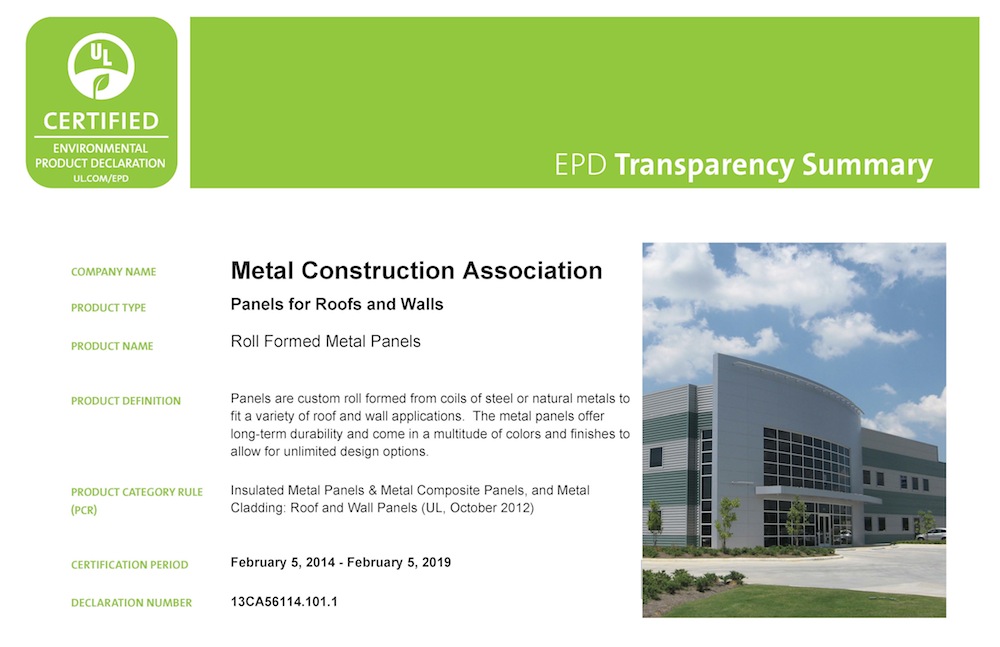Two Environmental Product Declarations (EPD), one for Metal Composite Material Panels and one for Roll Formed Steel Panels for Roofs and Walls, are now available free of charge from the Metal Construction Association (MCA) on its website.
These documents are the second and third EPDs to be released by MCA, an organization of manufacturers and suppliers whose metal wall and roofing components are used in buildings throughout the world. In October 2013, MCA developed an EPD for Insulated Metal Panels.
Environmental Product Declarations provide LCA-based information and details about the environmental impacts of products and assist purchasers and users in making informed comparisons. As more members of the design community use EPDs, which are now included in the new LEED V4 green building rating system, MCA is responding by issuing industry-wide EPDs that report the environmental impact of members' products and related assemblies.
"The way in which an EPD is used depends on what environmental impact categories relate to the architect, project or building owner. It's the same process as when you read a nutrition label on a food item. You look at what's most important to you while someone else will look at what's important to them. With an EPD it depends on what the project team feels is most important," notes Scott Kriner, MCA technical director. He also indicates that even if a project is not aiming for LEED certification, architects may require EPDs as a transparent method to describe the environmental impacts of materials used in a project specification.
MCA's EPDs contain valuable information about product definition, building physics, the basic material and its origin, product manufacture and processing, in-use conditions, life cycle assessment results, and testing results and verifications. Environmental impacts were assessed throughout the lifecycle of metal composite material panels and roll formed panels, including raw material extraction, transportation, manufacturing packaging, use, and disposal at the end of a building's useful life. The product configurations in the EPDs use ranges representative of all types of panels based on specific products from the primary producers that were used in the assessment and testing.
Information in the Metal Composite Material (MCM) EPD was prepared by MCA technical staff and members of MCA's MCM Fabricators Council and MCA's Wall Panel Council who are volunteers representing the leading manufacturers of MCM and companies that provide premium fabricating services for MCM. Originally known as Aluminum Composite Material (ACM), the name has evolved to Metal Composite Material to reflect the addition of other facer metals such as zinc, copper, stainless steel, and titanium.
MCM panels are formed by bonding two metal facer skins to a highly engineered plastic core. The panels can be finished in virtually any color a building owner or architect desires. Zinc, copper and titanium panels are usually installed unfinished, utilizing the benefit of these natural materials to achieve a unique weathered look over time.
Information in the EPD on Roll Formed Steel Panels for Roofs and Walls was prepared by MCA technical staff and members of MCA's Roofing Council and its Wall Panel Council who are volunteers representing the leading manufacturers of metal products used in roof and wall applications.
Roll Formed Panels are custom formed from coils of steel or natural metals to fit a variety of roof and wall applications. The panels can be factory-formed, formed on the jobsite using a mobile roll former, or a combination of both. For decades roll-formed metal wall and roof panels have served building owners and architects as one of the best combinations of economy, service and design. The metal panels offer long-term durability and come in a multitude of colors and finishes to allow for unlimited design options.
The Life Cycle Assessment for both the MCM and Roll Formed products on which the EPDs are based was performed for the MCA by PE International, Boston, MA. All content in the EPD documents has been reviewed by a UL Environment Review Panel and independently verified in accordance with ISO 14025 and ISO 14044.
To obtain a copy of any of the MCA EPDs visit www.metalconstruction.org or contact MCA at 847-375-4718 or mca@metalconstruction.org.
About the Metal Construction Association
The Metal Construction Association brings together a diverse industry for the purpose of expanding the use of metal in construction through marketing, research and technology and education. Companies involved in MCA gain tremendous benefit from association activities that focus on research, codes and standards, market development, and technical programs. MCA's market development efforts increase the use of metal materials in construction through the education of the building and design communities about the benefits of metal.
MCA's next national meeting is the 2014 Summer Meeting, scheduled for June 23-25, 2014 at the Westin O'Hare in Rosemont (Chicago), IL. Please refer to the MCA website www.metalconstruction.org for additional information.
Related Stories
Architects | May 23, 2023
DEI initiatives at KAI Enterprises, with Michael Kennedy, Jr. and Gyasi Haynes
Michael Kennedy, Jr. and Gyasi Haynes of KAI Enterprises, St. Louis, describe their firm's effort to create a culture of diversity, equity, and inclusion—and how their own experiences as black men in the design and construction industry shaped that initiative.
Multifamily Housing | May 23, 2023
One out of three office buildings in largest U.S. cities are suitable for residential conversion
Roughly one in three office buildings in the largest U.S. cities are well suited to be converted to multifamily residential properties, according to a study by global real estate firm Avison Young. Some 6,206 buildings across 10 U.S. cities present viable opportunities for conversion to residential use.
Architects | May 23, 2023
Ware Malcomb hires Francisco Perez-Azua as Director, Interior Architecture & Design, in its Miami office
Ware Malcomb hires Francisco Perez-Azua as Director, Interior Architecture & Design, in its Miami office.
K-12 Schools | May 22, 2023
The revival of single-building K-12 schools
Schools that combine grades PK through 12 are suddenly not so uncommon. Education sector experts explain why.
Architects | May 19, 2023
Snøhetta architects make a bid to unionize the firm's New York studio
Employees at the New York office of architecture firm Snøhetta have filed a petition with the National Labor Relations Board (NLRB) to unionize the studio. Snøhetta employees’ action marks the third time architects at a private-sector architecture studio in the U.S. took that step.
Healthcare Facilities | May 19, 2023
A new behavioral health facility in California targets net zero energy
Shortly before Mental Health Awareness Month in May, development and construction firm Skanska announced the topping out of California’s first behavioral health facility—and the largest in the nation—to target net zero energy. Located in Redwood City, San Mateo County, Calif., the 77,610-sf Cordilleras Health System Replacement Project is slated for completion in late 2024.
Government Buildings | May 18, 2023
GSA launches first biennial construction award program
Today, the U.S. General Services Administration (GSA) announced the new biennial GSA Construction Award program, which is seeking submissions this summer. The program was created to honor outstanding achievements in construction, with a focus on quality and craftsmanship, collaboration and team dynamics, sustainability, innovation, and technology. The first Construction Awards ceremony will take place in 2024.
K-12 Schools | May 17, 2023
Designing K-12 schools for students and safety
While bullying, mental health, and other acts of violence are all too common in schools today, designers have shown that smart and subtle preventive steps can make a big difference. Clark Nexsen’s Becky Brady shares how prevention and taking action at the design level can create safe and engaging learning environments.
Affordable Housing | May 17, 2023
Affordable housing advocates push for community-owned homes over investment properties
Panelists participating in a recent webinar hosted by the Urban Institute discussed various actions that could help alleviate the nation’s affordable housing crisis. Among the possible remedies: inclusionary zoning policies, various reforms to increase local affordable housing stock, and fees on new development to offset the impact on public infrastructure.
University Buildings | May 17, 2023
New UC Irvine health sciences building supports aim to become national model for integrative health
The new College of Health Sciences Building and Nursing & Health Sciences Hall at the University of California Irvine supports the institution’s goal of becoming a national model for integrative health. The new 211,660-sf facility houses nursing, medical doctorate, pharmacy, philosophy, and public health programs in a single building.

















